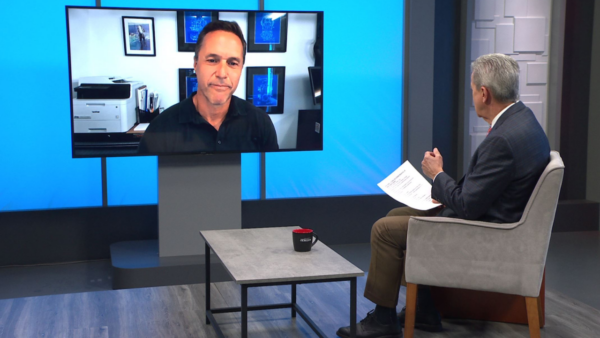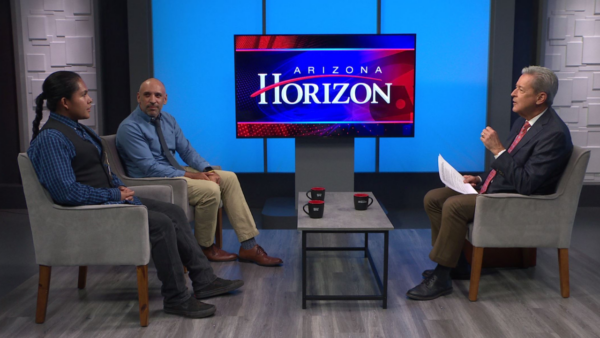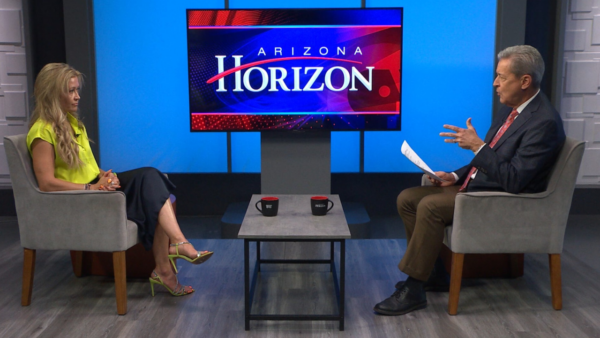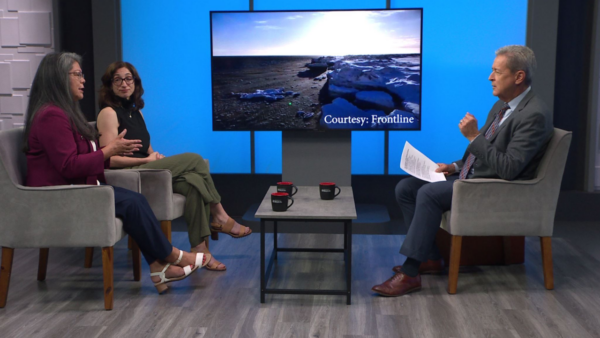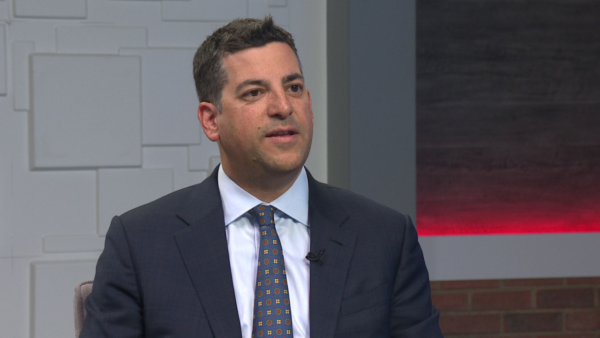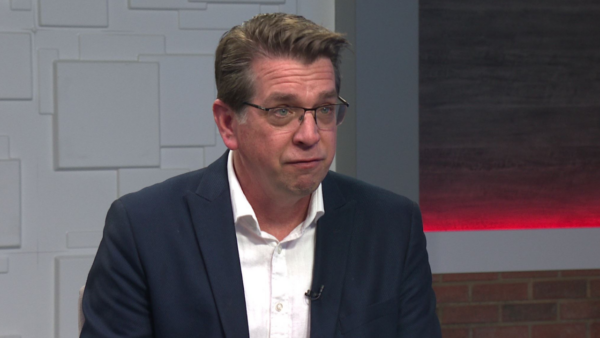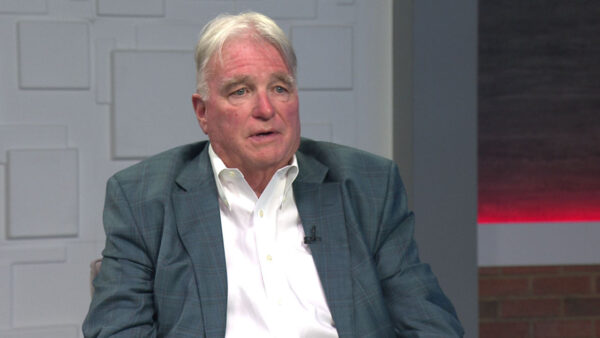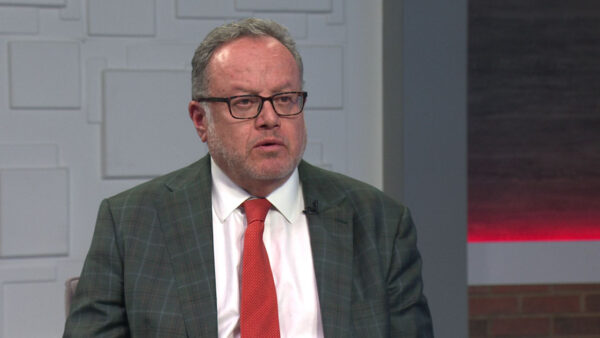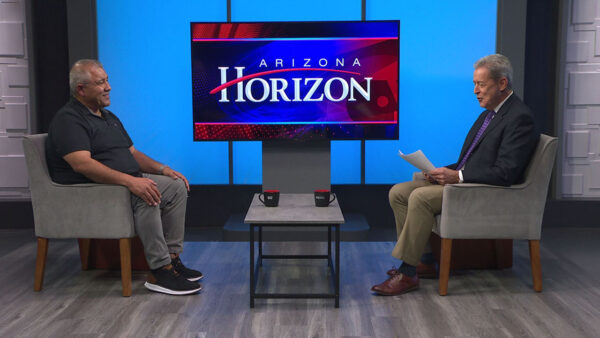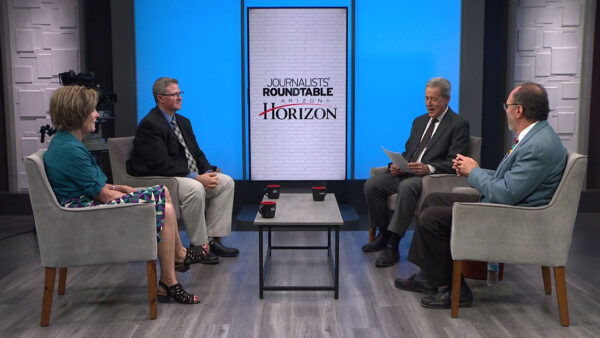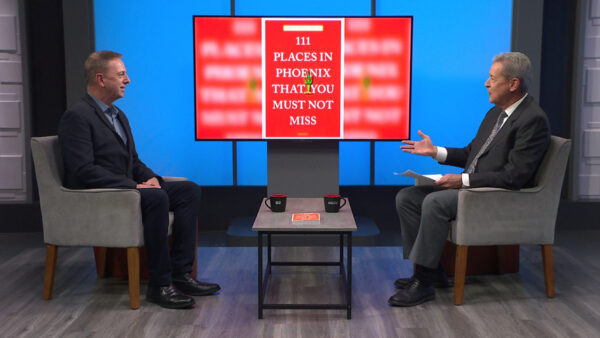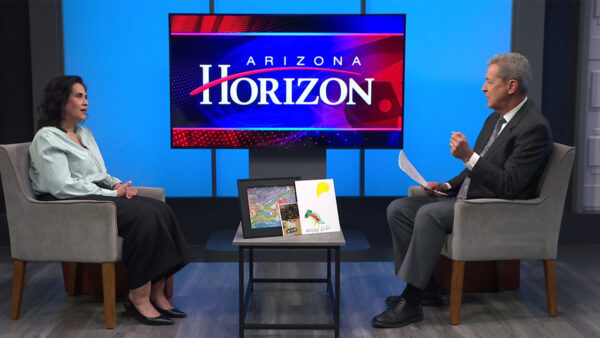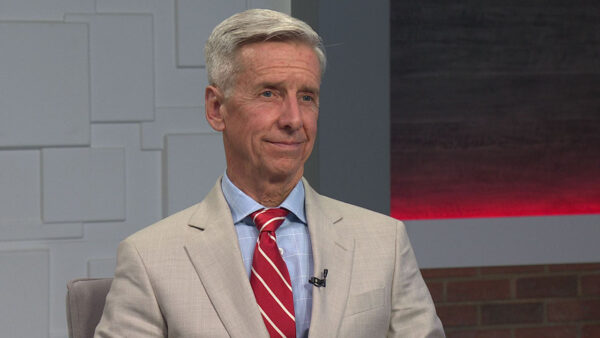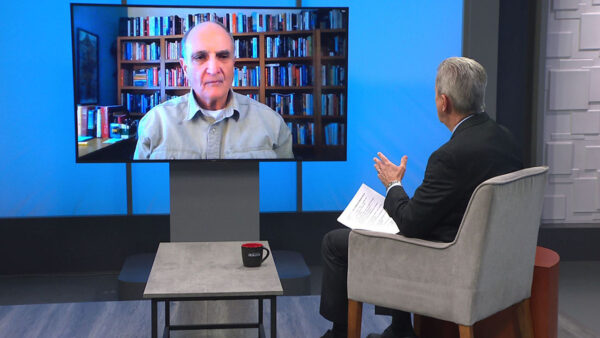Arizona voters provide their opinions about the proposals Governor Napolitano outlined in her State of the State address as well as President Bush’s approval ratings. ASU Poll Director Dr. Bruce Merrill and Assistant Poll Director Tara Blanc join the discussion.
Michael Grant:
Tonight on Horizon, our monthly Eight-Cronkite poll we polled on nine items outlined by Governor Janet Napolitano in her state-of-the-state address. She is doing very well by the people we surveyed. We continue our series on the willing issues in the 2006 legislature. That's next on Horizon.
Announcer:
Horizon is made possible by the friend of channel 8. Members who provide financial support to this Arizona PBS station. Thank you.
Michael Grant:
Good evening. I'm Michael Grant. Welcome to Horizon. First we have breaking news. Governor Janet Napolitano today slammed her veto stamp on that bill to pay for English language learner programs passed by republicans just last night. That leaves just a few hours before a half million-dollar fines start mounting against the state. Those fines ordered by a federal judge who gave law makes and the governor until tomorrow to come up with a solution to the Flores lawsuit which challenged the funding for English language learning programs. The governor has called a special session for this evening. The legislature convened about two hours ago. In her veto the governor particularly objected to a provision that would have given a corporate tuition tax credit for private schools. Today before the veto, lawmakers talked about the difficult and contentious work needed to get a bill to the governor.
Rep. Steve Gallardo:
We have gone 13 years without having properly addressed this issue. We have gone through a whole generation of kids who have gone through our educational schools here, and yet we're still not properly funding these programs that are meant to educate these kids. It has been a long, tougher, drag out fight here at the legislature to address this issue. We've gone 13 years and once again we have failed to address this issue properly.
Rep. Russell Pearce:
What we did yesterday had nothing to do with the court, in my opinion. It was in an effort to comply with proposition 203 that was overwhelmingly passed by the voters of this state, a structured emerging class. No more bilingual. This lawsuit is frivolous, beside judicial activism shouldn't be involved. It was based on bilingual education. It's just outrageous. This Tim Logan who continues to sue the taxpayer, to plunder the taxpayer for his agenda and the courts simply -- it's outrageous.
Michael Grant:
In just a few minutes, we have the chairs of the senate house and education committees to talk about that issue and other education issues for this session. Arizonans would think President Bush would get court's approval before conducting secret domestic spying. Also Arizona voters like what Governor Napolitano was selling in her state-of-the-state address. Those are the latest results from the latest KAET-ASU poll. It polled 395 registered Arizona voters conducted January 19 through the 22nd. It has a margin of error of 4.9%.
Announcer:
51% of those surveyed thought president bush should get court approval before conducting wiretaps on citizens. 38% said he did not need court approval. Bush's overall approval rating remains at 48%. 41% disapprove of the president's job performance. Governor Napolitano bated 1,000 in her proposals she announced in her state-of-the-state address. 65% of those we questioned agreed with the governor's call to place National Guard troops on the Arizona-Mexico border. 85% agreed to penalize employers, 11% disagree with that. Turning to her education proposal, 67% like the governor's call to expand all day voluntary kindergarten statewide. 18% do not like that idea. The governor has recommended that every teacher in Arizona be paid a minimum of 30,000 dollars a year. 38% agree with, that 8% disagree. The governor also wants every teacher to receive a pay raise, 74% say they like that idea, 16% disagree with it. The governor wants state workers to receive a substantial pay raise. 46% like the idea, 42% disagree, 21% had no opinion. Napolitano has suggested tax credits for small businesses to help them provide health insurance for their employees. 87% like the proposal, 7% don't like it. The governor also is proposing a law to make it harder to buy over the counter decongestants used to make methamphetamine. 74% support the governor's proposal, 18% don't support it. It finally, Governor Napolitano has suggested making convicted sex offenders wear electronic tracking devices. 75% agree, 15% disagree.
Michael Grant:
Joining me to talk act the results of the poll are its director, Bruce Merrill, also Tara Blanc, assistant poll director. Good to see both of you.
Bruce Merrill:
Good to be here.
Michael Grant:
I'm not surprised by the Arizona voters think that there should be warrants for domestic surveillance, are you?
Bruce Merrill:
No. But we did point out that the bill really is -- relates to when at least one, persons in the United States and one, persons outside the United States. I think it shows the continuing problem the president has with the war on Iraq. We've had talks on this show, well, in the last couple of years, year and a half, looking at -- we want to be safe, but at what price do we want to be safe? And I think what this shows is this increasing conflict between the need for people to be safe and yet they don't want to give up some of their safeguards. And certainly court approval for wiretapping is a very, very strong precept in American democracy.
Michael Grant:
I think that distance also that you get between now and 9/11 probably influences that result. But also to your point, I think it may be illustrative of the fact that a lot of Americans still don't necessarily see the connection between the war in Iraq and perhaps the war on terror and the events of 9/11.
Bruce Merrill:
I think the president's worked very hard to try to make that connection, but I'm not sure that he's done a real good job even to this day, telling or convincing the American people as to why we need to be there. And I think that's a lot of his problem. It's a complex issue. I'm not saying it would be easy for him to do that. But it does not appear to us when we keep looking at his measurements in Arizona that he's done a very good job communicating with the people as to why we're there.
Michael Grant:
Tara, we polled on several of the concepts the governor had offered in her state-of-the-state address. And I should state we tried to stay fairly close to her text to measure that.
Tara Blanc:
Yeah. We took the wording from the questions basically from the text of her speech and the executive summary of the speech. So the proposals are pretty general in nature. There aren't any figures attached to them. They're more ideas to outline her agenda and what it is she'd like to accomplish.
Michael Grant:
And we want to go into some of these individual results in a little depth. But just overall, I don't think I've ever seen a more consistent string. I think there's about 5 or 6 in a row that are literally -- they're registering from two-thirds to four-fifths approval.
Tara Blanc:
I think a couple things come in here to play. First of all, Napolitano is a very popular governor overall. People have been supportive of what she's doing and they like what she's doing. And I think that plays into how supportive people are of what she wants to continue to do. Another thing is that when she outlined her proposals, you have to realize this is an election year. And I'm certain that part of the strategy is to lay out an agenda in a way that will kind of agenda that will find support from voters, cross over between the democrats and republicans.
Michael Grant:
We will be talking about education issues in just a couple of minutes. But all day K., the base teacher salary, the teacher pay increase, all registering quite strongly in the poll.
Bruce Merrill:
Yes. And we found that all along with her proposals regarding education. You know, ever since she's been governor she's been pushing the all day K. There's just a great deal of support for that. If you really look at the question on the minimum salary, $30,000 for a teacher, when you realize after taxes that's not a lot of money and keeping in mind that most school districts pay the health insurance for the teacher but not their families so that the teacher then also has to take out of that $30,000 very frequently money to pay health insurance. So I mean, I'm more concerned about the 12% of the people that we polled that don't think that's a good idea, a 30,000 minimum than I am the 88% that said it is a good idea.
Michael Grant:
Everyone enthusiastically supporting National Guard troops on the border, which quite honestly I found to be one of the most curious proposals in the governor's state-of-the-state address because she had indicate add number of times she did not think that was a good idea.
Tara Blanc:
That's one of the proposals that I suspect is more of a political -- I want to say political statement but it's more a symbolic statement. She's made several statements in several proposals over the last few months coming out strongly in terms of various things about immigration problems and immigration laws. And I suspect that, that and even some things about the employer sanctions and so on and so forth are things that some people would like to see and there's good reasons on both sides. But it's a statement that basically says, we have a problem. We want to acknowledge we have a problem.
Michael Grant:
Strongly supportive of the employer sanctions. I'm not surprised that people were supportive of employer sanctions, but again these numbers were very high.
Bruce Merrill:
Very high. But as Tara has pointed out, they're one-sided. I mean, the statement just says in a general way that employers should have more responsibility for making sure that the people that they hire are here legally. But it doesn't say what that would involve and how much it might cost an employer to go through the process of finding out if a worker comes and gives them a legitimate social security card, it could cost the employer a great deal of money to check that out, be responsible for it. That ends up being passed on to the consumer, possibly. So as Tara pointed out, these are general concepts. And I don't think we can put too much emphasis in terms of exactly what they mean.
Michael Grant:
It's a good point, you know. A bill has been introduced that would require the use of the new federal database. That issue is going to be poked and prodded for the next 30 days. We probably ought to return to the subject in a later poll after maybe more of those issues have been developed and more meet put on the bones.
Tara Blanc:
As Bruce points out, too, if you were looking at some of these proposals that got a lot of support, when you start attaching numbers to them you will find people have more dividend opinions about whether they support it or how highly depending upon what impact it really does has.
Bruce Merrill:
Then you've got the issue of an election coming up. The governor is putting out these proposals. There is a lot of support for them as Tara pointed out. A very popular governor. But the republicans, that's what political campaigns are about. There's going to come and say, well, here's what is the matter with the issues, shape the issues in Norway. They'll be much closer after that.
Michael Grant:
The poll deliberately said substantial pay increase for state employees because again that was the phrasing used by the governor in her state-of-the-state address. And that's where it backed off a little bit on the poll results.
Tara Blanc:
Yes, it did. I believe we've seen that kind of reaction, for example, when we ask about pay raises for state legislators. And I think that there are people I suspect by some of the comments that we got that there are people who were concerned about an across the board pay raise. A lot of comments about preferring to see it done on merit and some other things instead of across the board raise. So I think that's why there was less support for that.
Bruce Merrill:
And what does substantial mean? If it means 40% to one person but it could mean 10% to somebody else.
Tara Blanc:
Or 5% to somebody else.
Michael Grant:
Well, the first poll of the legislative session. I always get tingly.
Bruce Merrill:
I know. It's just going to get more and more exciting. Maybe we just build these up, Michael, until next October.
Michael Grant:
Bruce Merrill, thank you for being here.
Bruce Merrill:
Thank you.
Michael Grant:
Tara Blanc, thank you.
Tara Blanc:
Thank you again.
Michael Grant:
This week we're looking at some of the key issues the legislature is tacking about talking about. First Nadine Arroyo.
Nadine Arroyo:
Governor Napolitano introduced several initiatives to improve the education program through k. Through 12. First on the plan, allocating 105 million dollar -- the budget also calls for complying with a federal court order to fund the English language learners program by fully funding it with $45 million. Under the budget, the gifted support program would receive more than half a million dollars, also making it a fully funded service. And another proposal is a $4 million grant to integrate technology in the classrooms and support programs such as science and math literacy and outreach. The governor proposes $90.7 million for a public school teacher's package. She proposes to increase the teacher minimum base salary to $30,000 and give all teachers a pay raise and assist with retirement contributions. In addition, the governor proposes to expand professional training programs for teachers. Under the plan, $2.5 million would be allotted to pay for performance, master teacher and professional development initiatives. The governor has made financial aid her biggest investment in the budget plan for colleges and state universities. In the budget plan, the state would contribute $9.1 million to student aid. All this in an effort to increase college attendance and minimize tuition costs. The budget also includes allotting $5.4 million to encourage universities to recruit students to high demand occupations and improve the graduation rate. And there is funding for state universities to expand specific departments, for example the university of Arizona would receive $2.9 million to expand its pharmacy program. Northern Arizona University would also receive funds, a combination of $3 million, 1 million to increase students counseling in order to improve student's retention rates and 2 million to work with community colleges throughout the state to provide greater opportunities for students looking to attain degrees in high demand occupations. The governor's education budget is the largest spending block in her 2006-2007 executive budget proposal.
Michael Grant:
Here with more on education issues at the state's legislature, Senator Toni Hellon, chair of the senate k. 12 education committee and representative Mark Anderson, chair house K-12 education committee. I want to get to some education issues. But obviously with the governor's veto of the English language learning bill we need to touch on that first. Representative Anderson, did the governor make a mistake vetoing that bill in your opinion?
Rep. Mark Anderson:
Well, of course, Michael, we would have liked to have seen her sign it so that we could find out what the courts really are looking for us to accomplish. By vetoing it when we don't have that opportunity. We have to go back to the drawing board. We have to come up with another concept that we hope will satisfy the courts. Ultimately, though, my perspective Michael is that the focus really needs to be on the kids. How can we be effective at teaching these kids how to speak English? I think there are some great programs out there that I've toured that I believe really do that. That's what we need to fund.
Michael Grant:
Senator Hellon, this is play being played this way. The republicans accuse the democrats of wanting to throw money at the problem. And the democrats accuse the republicans of -- well, I think in part being too cheap. And number two, also creating too much bureaucracy with this grant program. Does it really play out that simply on those two sides of the spectrum on this issue?
Sen. Toni Hellon:
I don't think it plays out simply in any case at all. I think we have all lost sight, as mark just said. We have all lost sight of what we're trying to do here. And we are getting wrapped up in accusations and you know, trying to make one another look bad or trying to do too much with one bill. There are children out there that need help. And that's what we're trying to do. We're trying to help them learn English so that they can transition into their classes, the rest of the students in their classes and they can move forward so that teachers don't have to spend the first part of every year retraining students.
Michael Grant:
Representative Anderson, I realize you don't have a crystal ball. But what's your best guess on what may happen in the next 5, 10, 12 hours? You can always stop the clock at midnight, I suppose. That's been done before.
Rep. Mark Anderson:
Well, I can only envision that we'll have to come up with some kind of compromise that I would think remove the corporate tax credit part of the bill and perhaps add in some additional dollars that perhaps would satisfy those who feel that there's just not enough money in it. And try that. I don't know if that would satisfy -- obviously when you do that you're losing some votes on the other end, people that feel unhappy with what the governor she today and all that. So it's always a fine line to where can you get the votes to get something up to the governor?
Michael Grant:
Senator Hellon, I want to touch on broader education issues because that's what we expect this segment to be and we're going to return to the floor as I guess that turned out to be fairly good timing on Thursday. No five-year implementation plan on all day k. The governor says let's complete the project this year. What do you think?
Sen. Toni Hellon:
I agree with that. And I've had discussions with a number of people over the summer and the fall. What has happened, in my estimation, is every year when we discuss the budget it becomes a bargaining point. Our kindergarteners become a bargaining point in the budget. That's been the three years of implementation. I think - in my estimation especially now. We phased in because we didn't have the resources at that point. The state didn't have the kind of resources. Now we do. It's time to phase this in. I think it's a good idea. And the parents are starting to ask. It's in some of the schools and not the others and parents want that now. Why aren't my kids offered that?
Michael Grant:
Some members of the Republican caucus, I think in both houses, say, well, yes, but hold on. Some districts are not yet positioned for a full deployment of all day K. Valid point?
Rep. Mark Anderson:
I would think that most districts, once the fund something there, would be able to implement all day kindergarten very quickly.
Michael Grant:
One of the concerns I've heard is necessary capital improvements, by people articulating that position.
Rep. Mark Anderson:
I think that may be a factor in a few cases. But we've had the students first program, which has allowed schools to bring them up to speed with capital. I don't know how big an issue it is. I really think the issue more is the fact that it's such a popular program in the public and one of the governor's top priorities. So until last week I would have told you that it's a guarantee that it was going to pass. With what you the governor has done and how she's made key legislators and our leadership mad, now I'm wondering if we're even going to see it happen. It's something that normally I would have said would have been a slam-dunk for this session.
Michael Grant:
Right. Every teacher in the state with a base salary of $30,000. Good idea?
Rep. Mark Anderson:
I have no problem with that. I think that is a minimum salary. Should be.
Sen. Toni Hellon:
Absolutely. I'm carrying that bill. I feel very strongly about that.
Michael Grant:
Representative Anderson, I know that you want to see mandatory physical education in grades is it 1 through 8?
Rep. Mark Anderson:
That's correct. Yes. We actually have a bill that is looking at how can we create the opportunity for kids to get more exercise. Unfortunately with the AIMS test and the other pressures that schools are under, a lot of them have gotten away from P.E. And as a result, kids are going through an entire day with no opportunity to exercise. So we want to say, this is important. We're dealing with a nutrition issue on the one hand with the obesity problem, but it's also a physical exercise issue. How do you get kids into the habit of exercising regularly and thinking about their health, which ultimately I believe affects the academic outcomes as well.
Michael Grant:
Well, you never know which way to jump on some of these issues. We have pulled away from a lot of those kinds of programs in public schools, including arts, music, physical education, with the increased emphasis on not just nationwide but global competitiveness, having more education curricula in the curricula. And sometimes it's difficult finding the right balance between those conflicting objectives.
Rep. Mark Anderson:
I think ultimately one of the solutions would be to add more time to the school day, which would again be very costly and will be probably the main barrier to that. But I just mention that idea and suddenly I got a letter from Eddie Basha, the governor called me, Tom Horne said they liked it. People recognize that we need more time on task. High school and other students are getting out at 2:30 in the afternoon. It doesn't make sense when we have so much we need these kids to get.
Michael Grant:
Representative Anderson touched on the junk food thing. That was done for the elementary grades last year. Should the junk food ban be continued on high school campuses as well?
Sen. Toni Hellon:
Well, I think ultimately that's a goal that we all have. But I don't believe we're going to be able to do that this year. I mean, I think there are other priorities and it probably will take longer to convince high schools. You know, the theory is that high schoolers should be learning some responsibility and should be able to make some decisions on their own. And so what we mandate to some of the lower grades doesn't necessarily transfer well to the schools. I'm not sure I totally agree with that but I don't think we're going to be able to expand it this year.
Michael Grant:
Representative Anderson we touched on 4 or 5 education related p subjects. What would disappoint you if it was not done in the education arena by the time the legislature calls it quits in 3, 4 months?
Rep. Mark Anderson:
Well, I think obviously the big-ticket item would be for me is the English language learner program. I know we're under a gun to do that. I guess we will do something. That's an important program, beyond the fact that we're asked to do this by the courts. Just for the fact that there are so many kids who are ELL students and they really need this done right. Because if they don't learn it right early on, then going to be behind the rest of their academic career.
Michael Grant:
Senator Toni Hellon, is there something that would particularly disappoint you if not accomplished by the end of the legislative session?
Sen. Toni Hellon:
The thing that jumps to mind for me is teacher pay. The more we talk about adding things to the curriculum, and I don't disagree that eventually we will need to add hours to the school day, we need to make sure the teachers are paid. And so that is my top goal.
Michael Grant:
All right. Senator Toni Hellon, thank you very much for joining us. Representative Mark Anderson, our thanks to you as well.
Sen. Toni Hellon:
Thank you.
Bruce Merrill:
You're welcome.
Announcer:
Illegal immigration will be at the center of many legislative fights this session. As we continue our series on the 2006 legislature, Horizon will look at some of the immigration-related bills that are expected to be addressed. That's Wednesday at 7 on Horizon.
Michael Grant:
We continue our series on key issues at the legislature Thursday with a closer look at the English language learner bill, perhaps we'll know by that time what it looks like. Then of course on Friday scalawags from the skate capital will be here for the reporters' roundtable. Thanks very much for joining us on a Tuesday evening. I'm Michael Grant. I hope you have a great one. Good night. ¶¶[Music]¶¶
Announcer:
If you have comments about Horizon please contact us at the addresses listed on your screen. Your name and comments may be used on a future edition of Horizon.
Horizon is made possible by the friends of channel 8, members who provide financial support to this Arizona PBS station. Thank you. ¶¶[Music]¶¶ Channel 8 programming is made possible by members like you and by --
Bruce Merrill:Director, Eight-Cronkite Poll;Tara Blanc:Assistant Director, Eight-Cronkite Poll;









